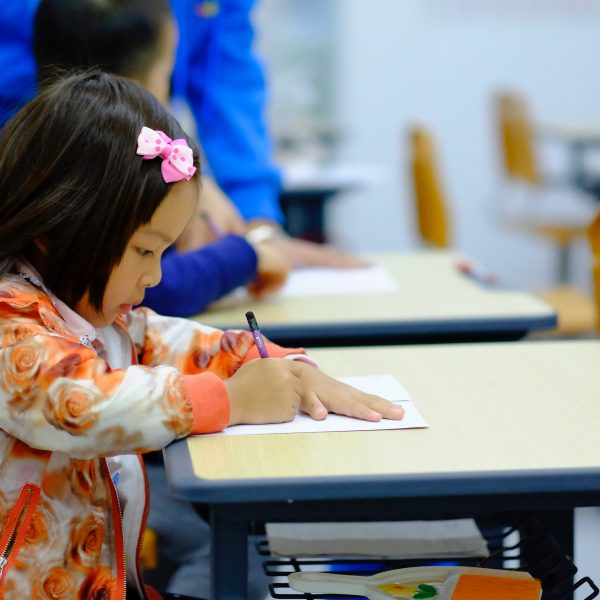More than academics says Telethon Kids study on school readiness

A new study by researchers at Telethon Kids Institute has found that there is a “much bigger picture” to consider when determining whether or not a child is ready to begin school.
In a study published in the Australian Journal of Social Issues, researchers reviewed the experiences of 4,000 families with preschool-aged children to better understand the link between school readiness and subsequent outcomes such as reading comprehension, school attendance, and emotional and behavioural difficulties.
School readiness is an important predictor of a child’s future success, and is broadly accepted to include capacities which will support a child at school, such as early academic ability, learning engagement, and social-emotional skills.
Despite this, Telethon Kids researcher Daniel Christensen said, the study had shown other factors – such as a child’s parents and family, their home environment and their local community – were just as important and should be part of the mix when working out how ready a child was for school and whether they needed extra support.
“This study has given us a rich insight into the complex factors that impact a child’s preparedness to start school, and the long-term benefits of ensuring young students are ready to learn,” Mr Christensen said.
Rather, he continued, school readiness is “much more than the skills and capabilities that children have when they arrive at school”.
“What we found is that school readiness is much more than the skills and capabilities that children have when they arrive at school, and that it really also includes how well families, schools, and communities can help children to transition to school,” he added.
“We looked at the child’s individual characteristics, so how they did on tests of their physical health, emotional maturity, language and cognitive development, but also their family characteristics, such as parental health and stress, parenting consistency and efficacy, and whether parent-child reading was a feature of family life.”
School-based factors, such as the learning environment and the teacher-child relationship, and neighbourhood characteristics – such as the sort of social support and connection in their local community environment – were also taken into account in reaching the findings.
As well as exploring these characteristics and circumstances when the child was aged between four and five years of age, researchers revisited the same participants at eight and nine years of age, to learn more about how they were faring academically, emotionally and behaviourally.
“Our findings confirm that while child capacities are important components of school readiness, they are not the only relevant factors that predict later outcomes,” Mr Christensen said.
“We found a mix of child, parenting, school and community risks in combination was the strongest predictor of lowest reading comprehension in the third grade, and a mix of parenting risk factors was the strongest predictor of child emotional and behavioural difficulties at ages eight and nine years of age.”
Mr Christensen said the findings indicated that in determining whether a child is ‘ready for school’, the focus should shift away from the child’s capacities to a more holistic view of factors outside the child.
“We need a rethink about what makes up school readiness, and whether we can collectively do a better job in supporting children and families who are falling behind,” Mr Christensen said.
Taking a strengths and deficits approach can miss those children who need different kinds of support, he continued, saying that the context in which children grow up is important in giving an optimal picture of school readiness.
He said children could do well on standardised tests but still be at higher risk for problems due to factors in their home environment. For example, the researchers found that a small group of children (around 16 per cent) who performed well on tests in kindergarten were still at risk of lower academic achievement and emotional and behavioural difficulties by the time they were eight to nine years old.
“This was due to a home environment where parents were low in parenting consistency, were uncertain about their parenting skills, and more likely to have a mental health problem,” Mr Christensen said.
The study, however, found that 70 per cent of pre-schoolers were “well-prepared” for school, and, as such, tended to perform better in a range of areas later in primary school, including reading, comprehension, school absenteeism and emotional and behavioural difficulties.
“The good news is that the majority of parents are supportive and nurturing, providing an environment which helps their child to thrive,” Mr Christensen said.
“But given the fact that education is the biggest investment society makes in a child’s life, we should be striving to provide the right kind of support so that all children have a chance to thrive.”
The Telethon Kids research was supported by the Australian Research Council Centre of Excellence for Children and Families over the Life Course, using data collected via the Longitudinal Study of Australian Children, a nationwide survey following the development of 10,000 young people and their families from across Australia.
To access the report, or for further information, please visit the Telethon Kids website, here.
Popular

Policy
Practice
Provider
Quality
Research
Workforce
Beyond the headlines: celebrating educators and the power of positive relationships in early learning
2025-07-07 10:00:24
by Fiona Alston

Workforce
Policy
Quality
Practice
Provider
Research
ECEC must change now, our children can’t wait for another inquiry
2025-07-02 07:47:14
by Fiona Alston

Workforce
Quality
Practice
Provider
Research
Beyond the finish line: Championing child protection one marathon at a time
2025-07-08 09:15:32
by Fiona Alston













